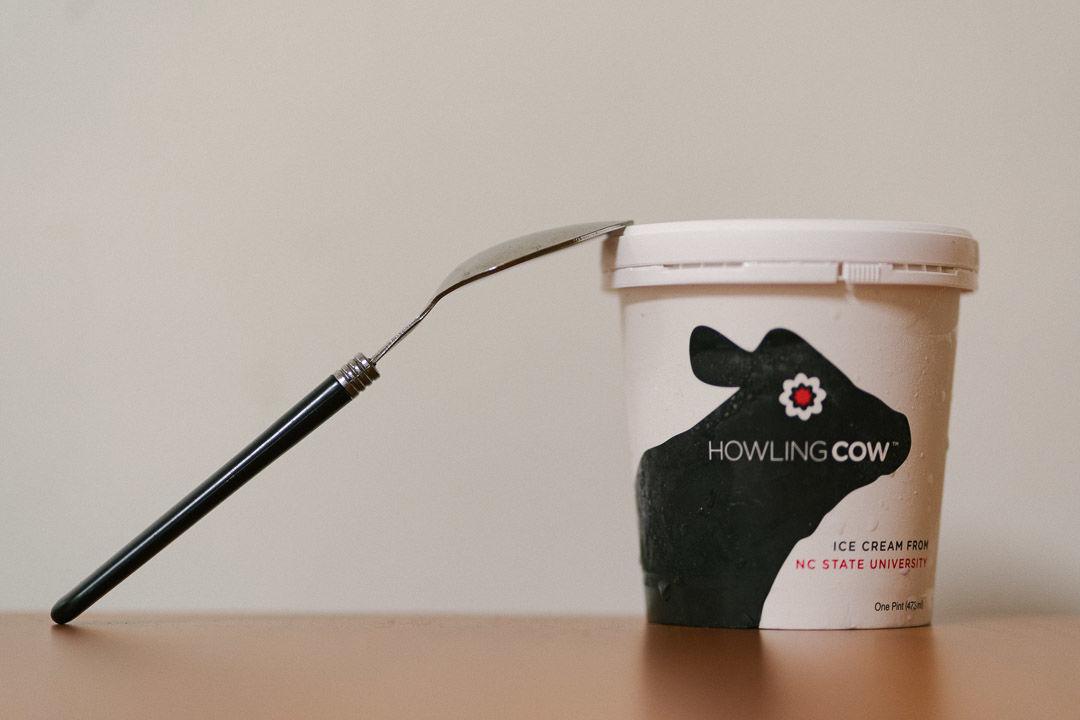Howling Cow ice cream has been sold on campus for over half a century, and the production process, from milking cows to designing flavors, is controlled entirely by NC State students and staff.
All of the ice cream sold on campus is produced and distributed by NC State’s Dairy Enterprise System. Carl Hollifield, interim director, coordinates the entire dairy production process.
“I support the mission of teaching, research and extension within our department, by the production and processing of milk and dairy products,” Hollifield said.
Hollifield’s responsibilities include managing the Lake Wheeler Road Field Laboratory, where approximately 300 acres of farmland support 170 dairy cows. Alex Ives, dairy education coordinator, spends a lot of time and resources making sure the cows are all comfortable, healthy and producing milk.
“Our biggest thing that we really try to focus on is, of course, cow health, and one of the ways we focus on her health is keeping her clean and well bedded,” Ives said. “The biggest thing that we need cows to do is lay down. If she’s not eating, if she’s not drinking, and if she’s not being milked, we really want her to be comfortable and relaxed.”
These cows spend a lot of time eating, drinking and being milked. According to Ives, most cows on the farm eat 100 pounds of feed in a single day, and drink about 50 gallons of water.
The facility and all of its cows are maintained by the farm manager and six full time employees. The farm also employs 20 NC State students to help keep the farm running. Along with the paid employees, students from NC State’s Animal Science department, veterinary school and food science department spend time on the farm completing research projects and earning class credits.
After milking, raw milk is then trucked to NC State’s Schaub Hall, where students work in the dairy processing plant to create USDA certified milk products.
“We bring milk here via tank truck, pasteurize it, homogenize it, package it,” Hollifield said. “Then the milk goes to students on campus or make ice cream with it … we typically pasteurize about 9000 gallons of milk a week, and we make about 1000 gallons of ice cream a week.”
After all ice cream has been made, it gets distributed to stores on campus and to the Howling Cow Dairy education center and creamery. Howling Cow is also sold at Harris Teeter in Raleigh, but that ice cream is produced at a separate dairy plant in High Point, NC. It may not be produced completely on NC State campus, but according to Hollifield, there’s no need to worry about a difference in taste.
“Harris Teeter Howling Cow is made in the exact same style … they have to use the exact same ingredients,” Hollifield said. “We went there and tested all of our ingredients with them. We said, listen, you have to make the base with pure cane sugar because that’s the way we do it here. You have to use this particular chocolate chip, you have to use that particular fudge swirl. So, the ingredients are exactly the same.”
For members of the Wolfpack looking for a healthier dessert, Hollifield hinted at the potential for a more diet-friendly version of Howling Cow ice cream to hit shelves.
“We’ve been working on a high-protein, low-fat ice cream with athletics, but it’s not in production yet,” Hollifield said. “We do have Power Pack, the high-protein chocolate milk that we make that has whey protein isolate in it.”
This new flavor, if it ever hits shelves, will have a hard time dethroning the current best-selling ice cream: Wolf Tracks.
“[Wolf Tracks] outsells our next flavor two to one,” Hollifield said. “I mean, all of our flavors are good, right? But there can only be one Wolf Tracks.”








